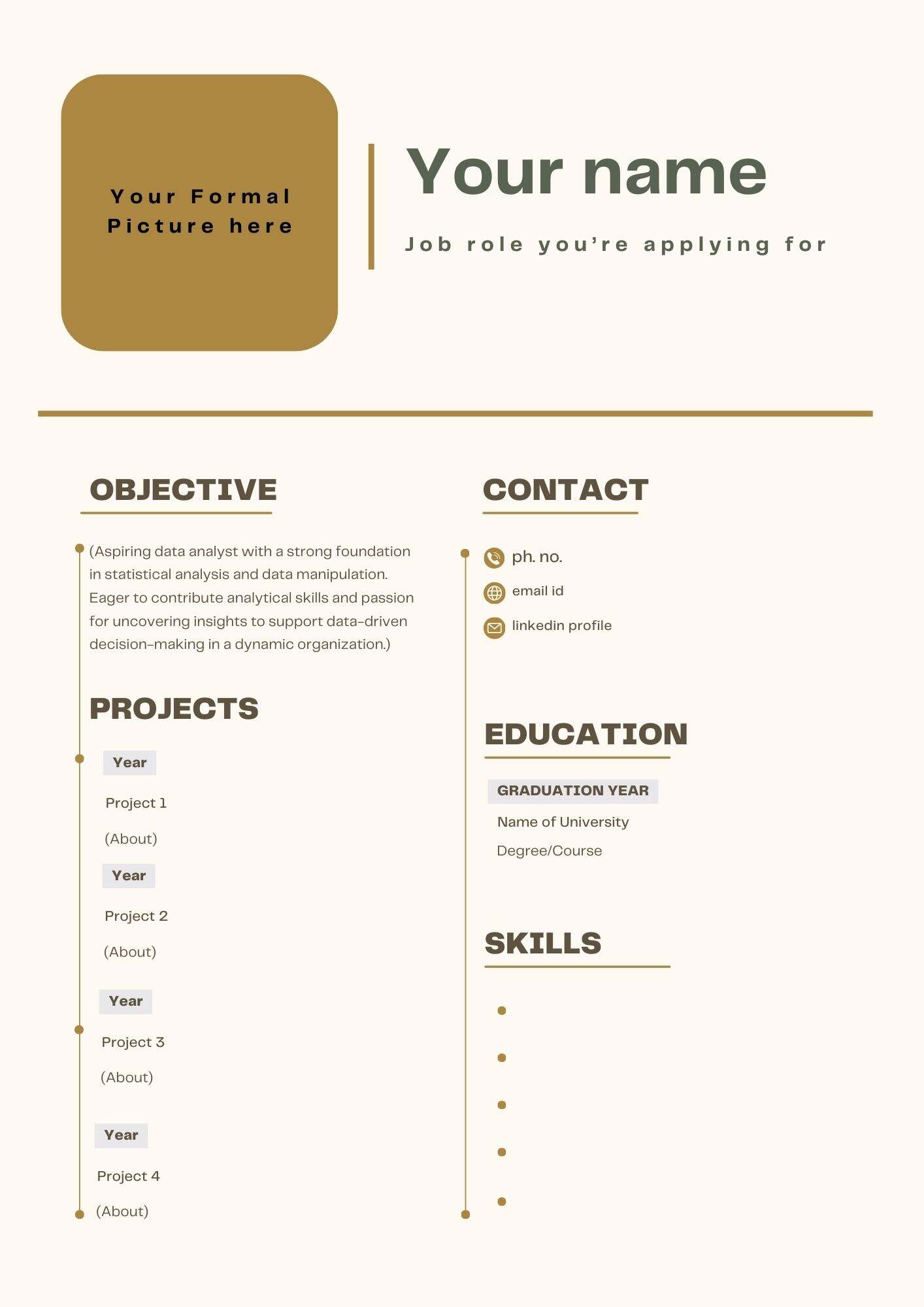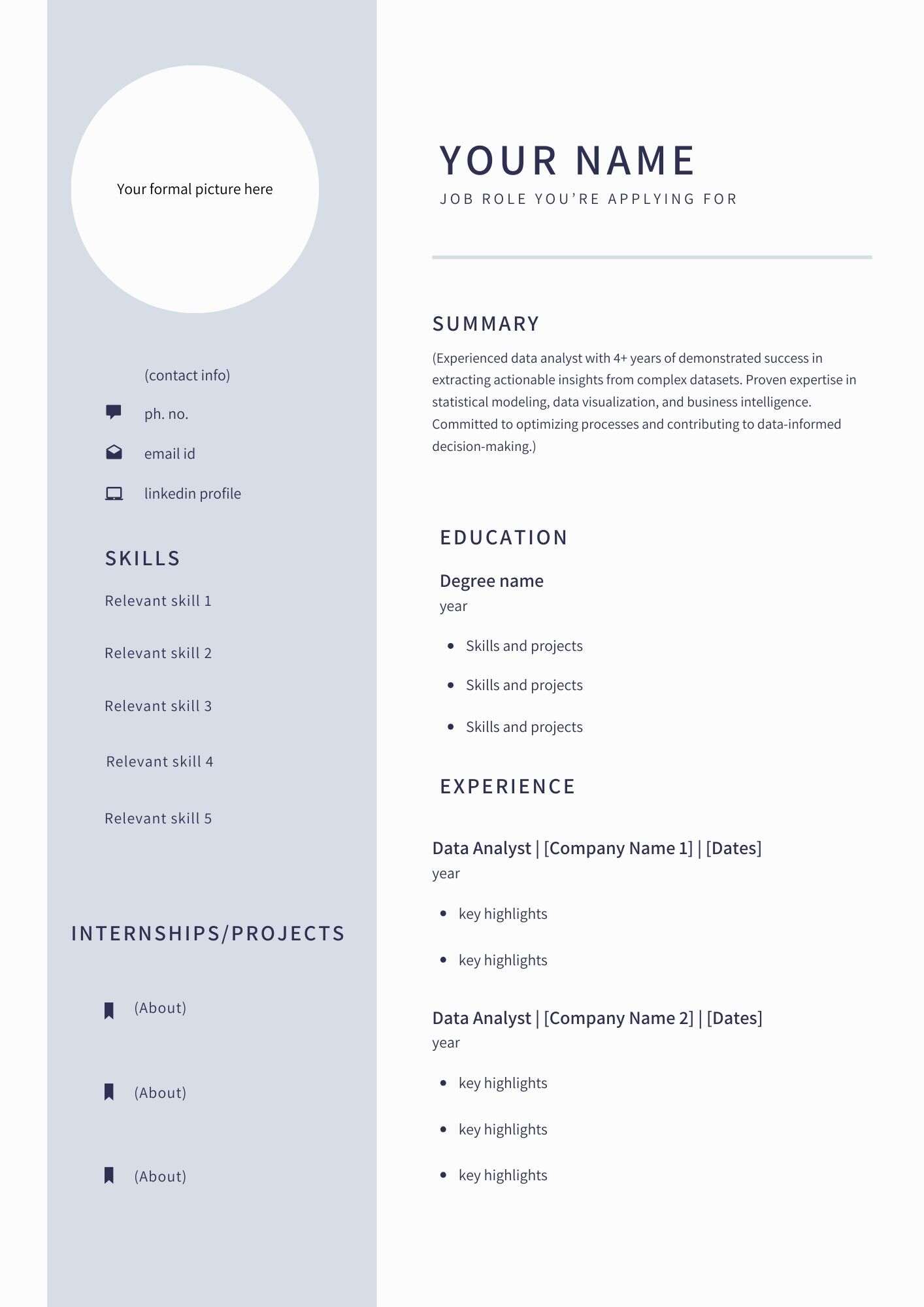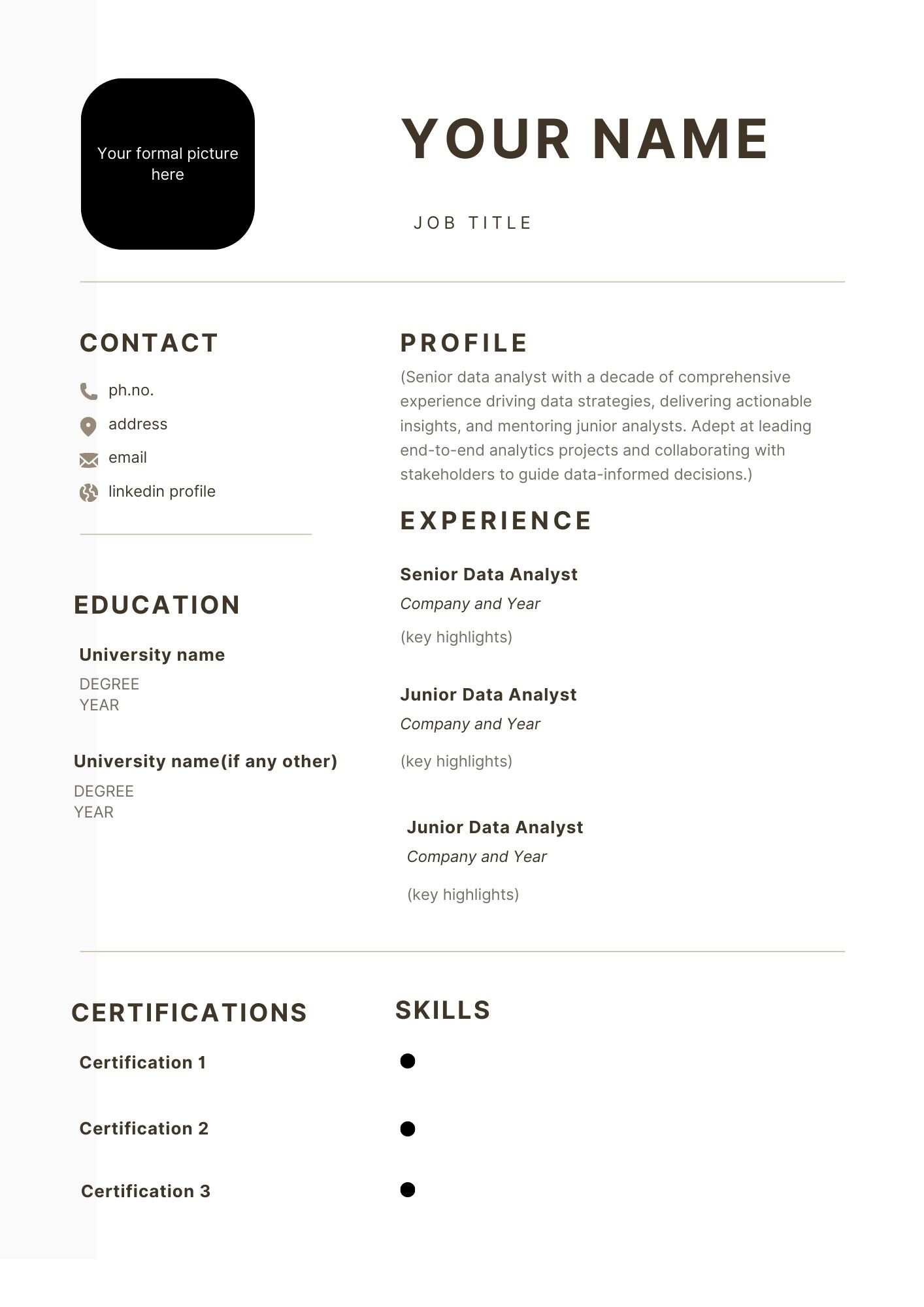Data analytics holds the coveted spot as the top-growing job, according to the World Economic Forum. The surge in opportunities is undeniable. However, this surge comes hand in hand with intense competition. The influx of highly qualified candidates competing for every open data analyst position necessitates that your resume shines brightly.
Yet, in a landscape where recruiters and hiring managers sift through many resumes daily, spending a mere average of 7.4 seconds on each, the window to capture their attention is remarkably brief.
This article will present a comprehensive guide on constructing a compelling resume for data analysts, effectively conveying the most significant facets of your professional profile. Our discussion will encompass the specific aspects of entry-level data analyst resume sample, mid-level, and experience, with examples for each.
Who is a Data Analyst?
A data analyst is a professional responsible for gathering, examining, and explaining extensive data collections to recognize trends, formations, and valuable insights that can guide business choices.
They employ statistical techniques, software applications, and programming languages to refine and handle data, produce visual representations and interactive displays, and formulate anticipatory models.
Professionals in data analysis operate in various sectors and fields, including healthcare, finance, marketing, and government. They are pivotal in aiding organizations to make data-based decisions, enhancing operational effectiveness, customer satisfaction, and business results.
For this purpose, data analysts must possess proficient abilities in analysis and problem-solving, alongside expertise in visualizing data, extracting valuable information, and carrying out statistical evaluations.
Data Analyst Resume Examples with reasoning for each of them
Indeed a guide to preparing the resume for data analyst is important. Listing all your skills in an organized way speaks a lot about the analyst. Hence, we have discussed below the data analyst resume sample for freshers, mid-level, and experienced analysts.
Data Analyst Resume for Freshers

Reasoning:
While writing a data analyst resume for freshers, it’s crucial to emphasize relevant skills gained through education and projects. The entry level data analyst resume highlights proficiency in foundational tools like Python and SQL and showcases a practical understanding of statistical techniques.
The projects section demonstrates hands-on experience, illustrating the candidate’s ability to apply learned skills to real-world scenarios. The objective statement provides a clear career goal and passion for data analysis, while soft skills like communication and teamwork indicate the candidate’s potential as a valuable team member.
Data Analyst Resume for Mid-Level Data Analyst

Reasoning:
In this mid-level data analyst resume, the candidate emphasizes their extensive experience and achievements in the field. The skills section showcases the mastery of a wider range of tools and techniques, reflecting their advanced proficiency. The experience section includes specific accomplishments, quantifying the impact of their work on business outcomes.
The education section highlights an advanced degree, further supporting the candidate’s expertise. The summary concisely overviews their career trajectory and commitment to data-driven decision-making.
Data Analyst Resume for Senior Data Analyst

Reasoning:
For a senior data analyst, the resume focuses on leadership, strategic thinking, and a proven track record of driving data-driven initiatives. The skills section highlights various technical expertise, including advanced analytics techniques and leadership abilities. The experience section emphasizes accomplishments that showcase the candidate’s impact on organizational outcomes and their ability to lead teams.
Including certifications supports the candidate’s commitment to staying current in the field. The profile overviews their senior-level experience and leadership role in data analysis initiatives.
Also read: Top 10 Data Analytics Projects in 2022
How to write the Resume Summary?
Hiring managers already have a lot on their plates, leaving them with little time to read the entire resume, look up your profile, and do extensive research on your capabilities. To catch the recruiters’ attention, the first few lines of your resume should describe you engagingly. The resume summary does this.
Usually, we see resume objectives on the top of the resume samples, which is definitely a good option for a fresher’s resume. But, if you have some years of experience or can highlight your personality and achievements better, add a summary at the top of your resume.
Rightly placed under your name and contact information, a resume summary perfectly portrays your achievements, experience, and interests that best suit the job role. It should be three to four sentences long, having a clear description in first person voice.
Mention your highest achievements and valuable skills first to make recruiters select you for the next rounds. A resume summary binds your personal and professional skills together to portray you as a potential candidate for the position.
It should be crafted using high-impact keywords to pass the ATS (Applicant Tracking Systems) companies use to shortlist the suitable candidate from the bundle of resumes.
Resume Summary for a Data Analyst
A data analyst resume summary should cover business acumen, industry expertise, and master professional skills. Some key points for framing your data analyst resume summary are mentioned below.
- First things first: mention your highest qualification, designation, and experience in the initial lines of your summary. For example-
- Professional marketing analyst with experience of 5 years
- Skilled and insightful data analyst with experience of 3+ years in business process analyses
- Analytics manager having a background in driving $1M revenue from proactive recognition of products and marketing
- It should be tailored effectively using the job description to have a clear pass from the ATS.
- Your summary should describe the skills mandatory for a data analyst. Using words like process-oriented, dedicated, analytical, interpreting, finding insights, etc.
- It should describe the type of data or products you have handled.
Let’s make a resume summary for a data analyst resume using the provided job description.
Job description:
- Use historical data sets along with intended product transformations to model and predict industry trends
- Apply data cleaning and processing to handle and validate the data to apply analytical tools
- Deploy mining, statistical, and analytical procedures over the huge datasets to draw meaningful patterns and inferences
- Explore, visualize, and communicate the findings to convert inferences into actionable insights
- Creating and handling data models, databases, and big data platforms
Resume Summary for a Data Analyst
Sample 1
Dedicated Data Analyst with 3+ years of experience identifying problems and improving efficiencies of the data streams while coordinating with teams for project requirements. Proficient at receiving and monitoring multivariate data from Excel, business reports, and SQL. A curious tech geek able to synthesize quantitative information and communicate with clients and colleagues. Skilled in generating insightful reports for stakeholders for timely audit and compliance reporting.
Sample 2
Business intelligence analyst with sound experience in digital marketing. Successful at reacting systematically to dynamic business needs and priorities. Adept in utilizing historical data by applying analytical, statistical, and predictive modeling. Alchemy of detailing, analysis, and communicating helped me contribute to the 2% profit of XX’s revenue.
Skills to learn and include in Resume by a Data Analyst
Highlighting the relevant skill set is crucial when crafting a resume, particularly for entry-level data analyst positions. Emphasizing skills specifically related to the field of data analysis is of utmost importance in showcasing qualifications effectively.
The skill set for a Data Analyst resume is divided into two categories. One is the Hard Skillet, and the other is the Soft Skillset. We will discuss both of them below-
Hard Skills
-
Programming Proficiency (Python or R)
Mastery, like Python or R programming languages, is a cornerstone skill for data analysts. These languages empower you to manipulate, analyze, and visualize data effectively. Python, with its rich ecosystem of libraries (e.g., Pandas, NumPy, Matplotlib), is versatile for data manipulation and analysis.
R, renowned for its statistical capabilities, is especially useful for complex statistical modeling and visualization. Proficiency in these languages provides the foundation for various data-related tasks, making them indispensable tools for any data analyst.
-
Data Manipulation and SQL
A deep understanding of data manipulation techniques is pivotal for extracting meaningful insights. Structured Query Language (SQL) expertise enables you to efficiently retrieve, update, and manage database data. Proficiency in SQL allows you to perform complex queries, join multiple tables, and aggregate data, which are fundamental skills for accessing and organizing information in diverse datasets.
-
Data Visualization (Tableau or Power BI)
Skillful data visualization is essential for conveying insights to technical and non-technical audiences. Tools like Tableau and Power BI allow you to create visually appealing dashboards and reports. By mastering these tools, you can effectively represent patterns, trends, and correlations, making data-driven insights accessible and impactful for decision-makers.
Also read: Of What Use Is Tableau to a Data Analyst?
-
Statistical Analysis and Modeling
A strong grasp of statistical methods is the bedrock of data analysis. Proficiency in techniques like regression analysis, hypothesis testing, and clustering empowers you to uncover patterns and relationships within data. These skills are indispensable for drawing accurate conclusions, making predictions, and guiding informed business decisions based on data-driven insights.
Reading resources:
-
Excel and Spreadsheet Proficiency
While often seen as a basic tool, Excel remains a powerful asset for data analysts. Proficiency in advanced Excel functions, pivot tables, and data analysis tools enhances your ability to manipulate and summarize data efficiently. This skill is particularly valuable when working with smaller datasets or conducting preliminary analyses.
-
Machine Learning Fundamentals
Understanding the fundamentals of machine learning is becoming increasingly valuable in data analysis. Familiarity with concepts such as supervised and unsupervised learning, classification, regression, and clustering opens the door to predictive modeling and advanced analytics. While not always required, having a foundational knowledge of machine learning equips you to tackle more complex data challenges and offer insights beyond traditional statistical analysis.
AnalytixLabs offers varied courses to excel Python, R, and Machine Learning, and more. You can also explore our Data Science 360 certification course, PG in Data Analytics course, or PG in Data Analytics course at your convenience or book a demo with us.
Soft Skills
1. Communication Skills
Effective communication is paramount for data analysts. The ability to convey complex findings and insights clearly and understandably to technical and non-technical stakeholders is invaluable. Clear communication ensures that the results of your analyses are actionable and can drive informed decision-making across the organization. Whether presenting findings in meetings, writing reports, or collaborating with team members, strong communication skills foster understanding and alignment among various parties.
-
Problem-Solving Abilities
Data analysts often encounter intricate challenges that require creative problem-solving. Being adept at breaking down complex problems into manageable components, identifying patterns, and developing innovative solutions is a hallmark of a proficient data analyst. Problem-solving skills enable you to devise effective strategies for data analysis, address unexpected obstacles, and continuously improve your analytical approaches.
-
Critical Thinking
Critical thinking is the foundation of sound data analysis. It involves examining data from various angles, questioning assumptions, and evaluating the validity of conclusions drawn. By thinking critically, data analysts can avoid biases, consider potential limitations, and ensure their interpretations are grounded in evidence. This skill is pivotal for producing reliable insights that contribute to informed decision-making.
-
Attention to Detail
Data analysis demands a meticulous approach. Small errors or oversights can significantly impact the accuracy and validity of your findings. An eye for detail ensures data is correctly processed, transformed, and analyzed, leading to reliable insights. Rigorous attention to detail helps you identify outliers, inconsistencies, and anomalies that could influence your conclusions and subsequent decisions.
-
Teamwork Skills
Collaboration is crucial to a data analyst’s role, necessitating adept teamwork skills. If you possess prior experience in collaborative environments, highlight this on your resume.
Also read: How Many Data Analyst Interview Questions Can You Answer?
How to write your work experience as a Data Analyst?
The most important section of your data analyst resume is your work experience. Recruiters are interested in hiring you if they find you high on skills for the position in hand. So you need to portray your experience clearly, precisely, and interestingly. This section enlightens your previous job roles, learning, accomplishments, and contributions.
It could be beneficial if relevant and appropriate job responsibilities are described, in addition to using quantifiable statements of your achievements for validation. This section includes all your job descriptions, internships, certification programs, and part-time or volunteer work, all mandatorily in a reverse chronological format. Each of the aforesaid will have the following attributes:
- Job title
- Organization or Employer name
- Location
- Joining and relieving dates of employment
- Detailed description of roles and responsibilities of job profile
For an Entry-Level Data Analyst
An entry-level job posting will require your eagerness and aspiration toward the data analyst field. To stand out in the race, focus on significant skills, academic qualifications, technical knowledge, industry-related certifications, projects undertaken, or internships.
Include your knowledge about the programming languages, computer fundamentals, and analytical skills you are good at. The objective is to display your readiness for the job profile.
Suppose you are a professional who has experience in a different field. In that case, you should derive the intersections of your previous job responsibilities such that they could be useful for your data analyst job role.
Having the business and domain acumen makes you a potential candidate for the posting. You can portray your soft critical, and creative thinking skills to describe your adaptability to fit the data analyst skill resume.
For an Experienced/Senior-Level Data Analyst
As a senior data analyst professional, you need to flaunt your experience in a detailed way. In your work experience section, you will highlight the automation procedures, tools, and technologies used by you in implementing data processing, modeling, analyses, and insight building.
Describe the accomplishments in a quantifiable manner (if possible) to demonstrate the impact created by you on the business. Some key points that could be included in job responsibilities are Machine learning skills, data management techniques, analytical skills, core competencies, project expertise, and business knowledge.
The syntax to describe your data analyst work experience may be Action verbs followed by tasks followed by metrics or results. Adding action verbs like created, designed, launched, achieved, and implemented to describe the task undertaken can provide a structure for job responsibilities.
Some of the general examples of job responsibilities for a data analyst job role are given below.
- Collected the required business data without missing critical components.
- Structured the quarterly projection records provided by senior analysts in an organized manner for decision-making.
- Developed 15 dashboards daily for higher-level reporting using SQL and Tableau queries within 4 weeks of joining.
- Build procedures to cut down the cost of analysis by $25k.
- Managed cross-functional teams from 3 locations to coordinate among the entry-level analysts to the VPs to drill business development, operations, and marketing.
FAQs
- What should be in the data analyst profile?
A data analyst profile should include a summary highlighting your expertise and skills, an overview of your relevant work experience, education details, technical skills, certifications, and projects showcasing your data analysis capabilities.
Additionally, you might incorporate any relevant achievements, awards, or publications that demonstrate your contributions to the field of data analysis.
Remember, your profile should effectively communicate your qualifications and make a strong impression on potential employers.
- What do data analysts do all day?
Data analysts spend their days collecting, cleaning, and analyzing data to identify patterns, trends, and insights that guide business decisions. They create visualizations, build models, and collaborate with teams to ensure data-driven strategies and solutions.








